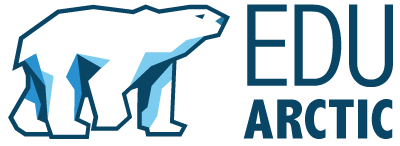Deliverable 6.4 “EDU-ARCTIC´s Replication strategies and roadmap” contains indications how to maximize the project’s impact and wider use, based on its very important and comprehensive results in all WPs and project activites.
Current policies in STEM education and key barriers related to the replication of the EDU-ARCTIC project and its components, in the identified most prominent regions, are identified and potential relevance to EDU-ARCTIC explored, upcoming actions and programs as Horizon Europe elaborated on, time frames studied, societal implications and majority addressed, as well as recommendations made on development paths that lead to the projects results being sustainably implemented in Europe and beyond.
Ways to secure the sustainability of the partner network are elaborated on, including a proposed MoU between the current partners.
New partners of strategic importance are identified, such as the University of the Arctic as well as partners and collaborators in Eurore and beyond, existing or possible financing schemes through public and/or private financing explored for replication of the project, its components and tools.
First steps in the replication of the project results have already been taken by project partners, including project partners’ participation in INTERACT lll, an application for EEA funding and ongoing discussion between individual partners and other networks in and outside of the EU. High level diplomats have taken interest in the project’s results and are encouraging it to be represented at the upcoming 2020 Science Ministerial meeting in Japan.
The current and anticipated results are highly encouraging for the replication of the EDU-ARCTIC project.
The clear observation of the report is that EDU-ARCTIC is of high EU and Global relevance. The replication of its program and components is very realistic and appropriate, as the interest in and awareness of the importance of STEM professional and applicable educational material and tools at secondary school level, not least related to the Arctic, is fast increasing in Europe and globally.

 This project (EDU-ARCTIC) has received funding from the European Union’s Horizon 2020 research and innovation programme under grant agreement No 710240. The content of the website is the sole responsibility of the Consortium and it does not represent the opinion of the European Commission, and the Commission is not responsible for any use that might be made of information contained.
This project (EDU-ARCTIC) has received funding from the European Union’s Horizon 2020 research and innovation programme under grant agreement No 710240. The content of the website is the sole responsibility of the Consortium and it does not represent the opinion of the European Commission, and the Commission is not responsible for any use that might be made of information contained.